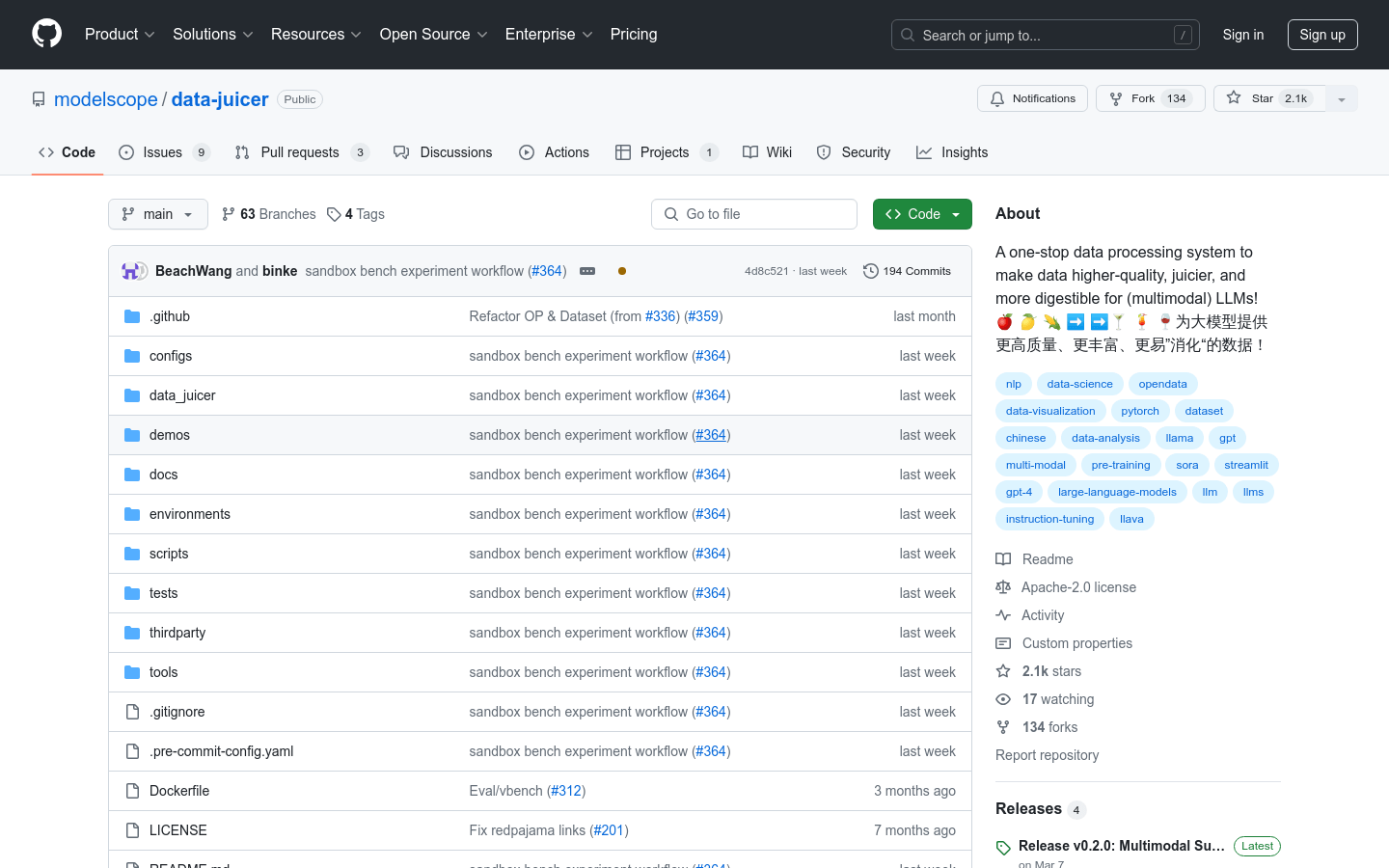

Data Juicer
Overview :
Data-Juicer is a comprehensive multimodal data processing system aimed at delivering higher quality, richer, and more digestible data for large language models (LLMs). It offers a systematic and reusable data processing library, supports collaborative development between data and models, allows rapid iteration through a sandbox lab, and provides features like data and model feedback loops, visualization, and multidimensional automated evaluation, helping users better understand and improve their data and models. Data-Juicer is actively maintained and regularly enhanced with more features, data recipes, and datasets.
Target Users :
Data-Juicer is designed for researchers and developers who need to process and optimize a large volume of multimodal data, particularly professionals working in the field of large language models. It helps improve the efficiency and quality of data processing, accelerating the model training and optimization processes.
Use Cases
In the field of financial analysis, Data-Juicer is used to optimize data and improve the predictive accuracy of models.
As a reading assistant, Data-Juicer helps process and analyze large volumes of document data, enhancing user experience.
In academic research, Data-Juicer is utilized to process scientific literature data, assisting researchers in data analysis and model training.
Features
Systematic and reusable: Offers over 80 core operators, more than 20 reusable configuration recipes, and over 20 feature-rich specialized toolkits.
Data loops and sandbox: Supports one-stop collaborative development between data and models, enabling fast iterations through a sandbox lab.
Production-oriented: Provides efficient parallel data processing workflows, optimizes memory and CPU usage, and includes automatic fault tolerance.
Comprehensive data processing recipes: Offers dozens of pre-built data processing recipes suitable for various scenarios such as pre-training and fine-tuning.
Flexible and scalable: Supports most data formats and allows flexible combinations of operators, enabling users to customize operators for data processing.
User-friendly experience: Features a clean design, comprehensive documentation, easy start guides, and intuitive configuration methods.
How to Use
1. Install Data-Juicer: You can install it via source code or using pip.
2. Prepare the dataset: Ensure that the dataset format meets the requirements, such as jsonl, parquet, csv, etc.
3. Configure the data processing workflow: Select the appropriate operators and configure parameters according to your needs.
4. Run the data processing: Use the process_data.py tool or the dj-process command-line tool to process the dataset.
5. Analyze the data: Use the analyze_data.py tool or the dj-analyze command-line tool to analyze the dataset.
6. Visualize the data: Use the app.py tool to visualize the dataset in your browser.
7. Build a sandbox lab: Experiment, iterate, and optimize data recipes in a sandbox environment.
8. Contribute and provide feedback: Participate in the community by contributing code or providing feedback to improve Data-Juicer.
Featured AI Tools

Openui
Building UI components is often tedious work. OpenUI aims to make this process fun, quick, and flexible. This is the tool we use at W&B to test and prototype the next generation of tools, built on top of LLMs to create powerful applications. You can describe your UI with imagination, and then see the rendering effect in real time. You can request changes, and convert HTML to React, Svelte, Web Components, and more. Think of it as an open-source and less polished version of a V0.
AI Development Assistant
757.9K

Opendevin
OpenDevin is an open-source project aiming to replicate, enhance, and innovate Devin—an autonomous AI software engineer capable of executing complex engineering tasks and actively collaborating with users on software development projects. Through the power of the open-source community, the project explores and expands Devin's capabilities, identifies its strengths and areas for improvement, thus guiding the advancement of open-source code models.
AI Development Assistant
595.1K















